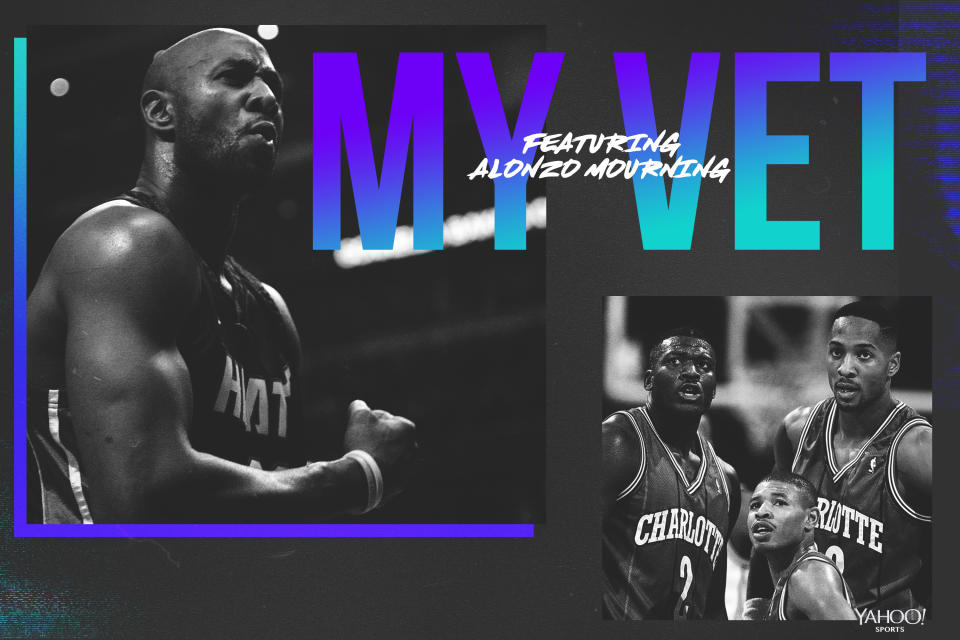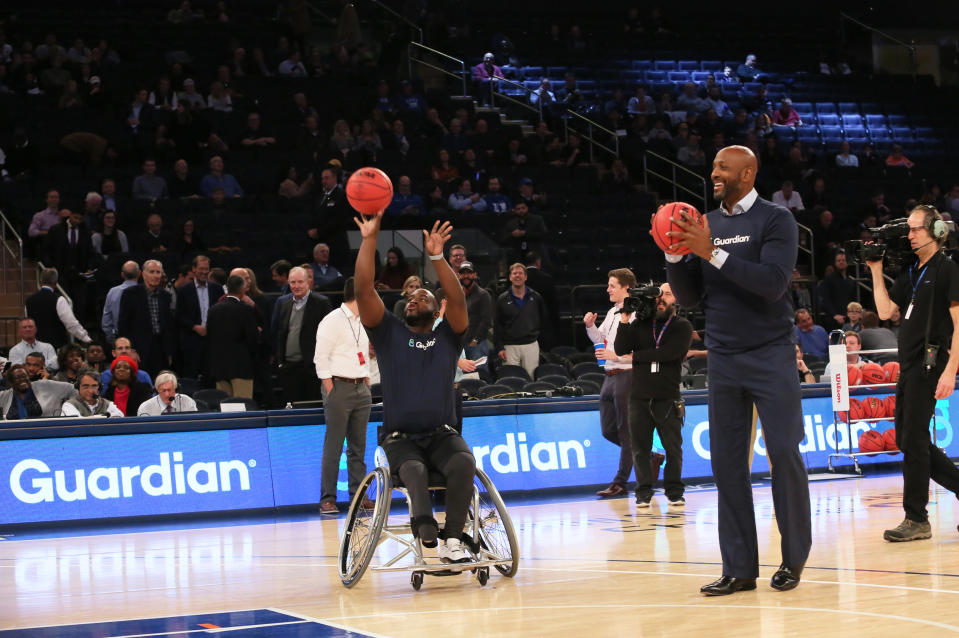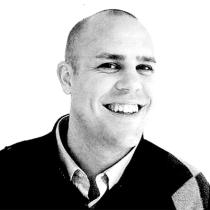My Vet: Alonzo Mourning on Bill Russell, Muggsy Bogues and load management
“Everyone has a vet.” That statement from Kevin Garnett has stuck with me. Sam Mitchell was his. He was Rajon Rondo’s. It’s the circle of NBA life. You would be hard-pressed to find a player whose career was not set on its course by a veteran in his first locker room. Those who become vets themselves pass those lessons along. These are their stories.
[Previously on My Vet: Ray Allen • Vince Carter • Zach Collins • Chris Mullin • Dennis Scott • Purvis Short • Isiah Thomas]
Selected No. 2 overall by the Charlotte Hornets in the 1992 NBA draft, between Shaquille O’Neal and Christian Laettner, Alonzo Mourning enjoyed a Hall of Fame career that included two Defensive Player of the Year awards and seven All-Star appearances. He overcame a life- and career-threatening kidney disease in 2003, returning from a transplant to win a championship with the Miami Heat in 2006.
Mourning spoke to Yahoo Sports before partnering with Guardian Life to benefit the Wounded Warrior Project during Thursday’s 2K Empire Classic at Madison Square Garden, where he and wheelchair basketball star Chris Saint-Remy will play H.O.R.S.E. to showcase that disability is not inability.
Who is your vet, and how did that relationship develop?
Mourning: It started with Muggsy Bogues in Charlotte. It’s amazing that the smallest guy in the NBA at that particular time would take one of the largest guys in the league under his wing. I was 22 years old, and just his influence alone truly helped get me on the right path.
What on- and off-court lessons did you learn from him?
Mourning: First thing he told me was, “Don’t let me beat you down the court.” I was doing a whole lot of sprinting after that conversation. He said, “Look, don’t worry about the ball. The ball will find you.” And he taught me a lot about professionalism and just showing up. His influence was very helpful.

What were your rookie duties?
Mourning: When I first came in, right after shootaround, a couple of the veteran guys threw a bunch of the basketballs up in the stands, showed me the ball rack and had me retrieve the balls. I had to get luggage. It was a lot of different stuff. It was just part of being a rookie; you had to pay your dues. They don’t go through that anymore, though. We handle these guys with white gloves now.
What was your “Welcome to the NBA” moment?
Mourning: I had the benefit of playing against Patrick Ewing and Dikembe Mutombo coming out of college. Just that experience alone prepared me to play against any one of the opposing centers in the NBA, so there was not really too much intimidation. I came in very comfortable and ready to play as soon as I hit the ground. I was one of the beneficiaries of being able to play ball against professionals way before I started becoming a professional athlete, so my experience with them helped me transition a lot better.
What was your “I’m here to stay” moment?
Mourning: Listen, I never questioned my durability or my longevity in the NBA. I never questioned it. I was very confident. I came out of college highly touted. [Shaquille O’Neal] went first, I went second. I could’ve easily went first. My rookie season speaks for itself, so I never questioned my ability. I was very confident what I was capable of doing.
Obviously, your situation was truly unique, but given how you were able to defy odds and extend your career, I wanted to get your thoughts on the idea of load management in today’s NBA.
Mourning: Michael Jordan gave a quote. Arguably the greatest player to ever lace them up, and he gave a quote to his employees that we pay you to play 82 games. So, I’m a huge advocate of that. If you are paying these young players, you pay them with the expectation to play 82 games.
Now, throughout the course of the season, yes, there are obstacles that you deal with — injuries and things of that nature. Every now and then, you become ill, flu or whatever it is, there are family issues that come about, so, yeah, things happen, life happens, but you go into the season with the intention of playing 82 games.
From a load management perspective, maybe there are games where some of your superstars might not play as many minutes as they’ve played in the previous weeks, but the long and short of it is we expect you to play 82 games. That’s the way I went into it. I went into every season expecting to play every game of the season.

You mentioned once that Scottie Pippen said LeBron James would have kicked Jordan’s butt. Was that Pippen jokingly trash-talking MJ or was that for real? Can you put some context to that?
Mourning: I don’t recall that, man. We might have had that conversation, but I don’t recall it. They’re great players. What other opinion can you say? You can’t have any other opinion about them other than they’re great players and two of the greatest players to ever play this game.
What was it like to present Bill Russell with his Hall of Fame ring?
Mourning: Bill Russell is arguably the greatest winner in sports, and when you think about the overall obstacles that he had to overcome in order to win, then that is deserving of being celebrated. When I had an opportunity to present this Hall of Fame ring to him, I didn’t hesitate. It was a tremendous honor. He’s someone who I look up to. He’s a pioneer for our game. He paved the way for us to have this beautiful game that we have today and for the fans to enjoy it. He was one of the pioneers who helped pave the way to create the basketball atmosphere that we have. He helped contribute to that.
Now, when I had an opportunity to present this ring to him, it was a no-brainer for me. It truly was. I looked at it as an honor to present Bill Russell with his Hall of Fame ring. A lot of people don’t really know the story behind him not receiving that ring, simply because he elected not to accept a Hall of Fame ring because there were other people of color who were deserving of getting into the Hall of Fame who weren’t getting the recognition they deserved. So, because of that, he decided not to accept his Hall of Fame ring at that particular time as a protest for those other players. That kind of speaks to the type of individual he is. It wasn’t about him. It was about winning and about the integrity of the game.

Mentorship flows through your current role with the Miami Heat and your work with the Wounded Warrior Project on Thursday. Why has this become such a big part of your post-playing career?
Mourning: Mentorship means a lot because I wouldn’t be here without someone else’s contributions. That’s why I’m here to show everyone that, regardless of what your obstacles are in life, your disabilities, whatever they may be, it doesn’t mean it will prevent you from doing what you want to do in life.
I feel like throughout my career I had to overcome so many obstacles in order for me to accomplish my goals, but more importantly my relationships with the next generation of players has allowed me to inspire them through my job in basketball player development with the Miami Heat, as well as partnering up with Guardian Life. I think my experience, my story, my journey is a positive influence to individuals who are trying to overcome different disabilities and inspires them and helps them understand that it does not mean that it will prevent you from continuing to live your life and do what you need to do.
If you are an active or former NBA player who would like to share your My Vet story, contact Yahoo Sports writer Ben Rohrbach via email, Twitter, Instagram or Facebook.
– – – – – – –
Ben Rohrbach is a staff writer for Yahoo Sports. Have a tip? Email him at rohrbach_ben@yahoo.com or follow him on Twitter! Follow @brohrbach
More from Yahoo Sports:

